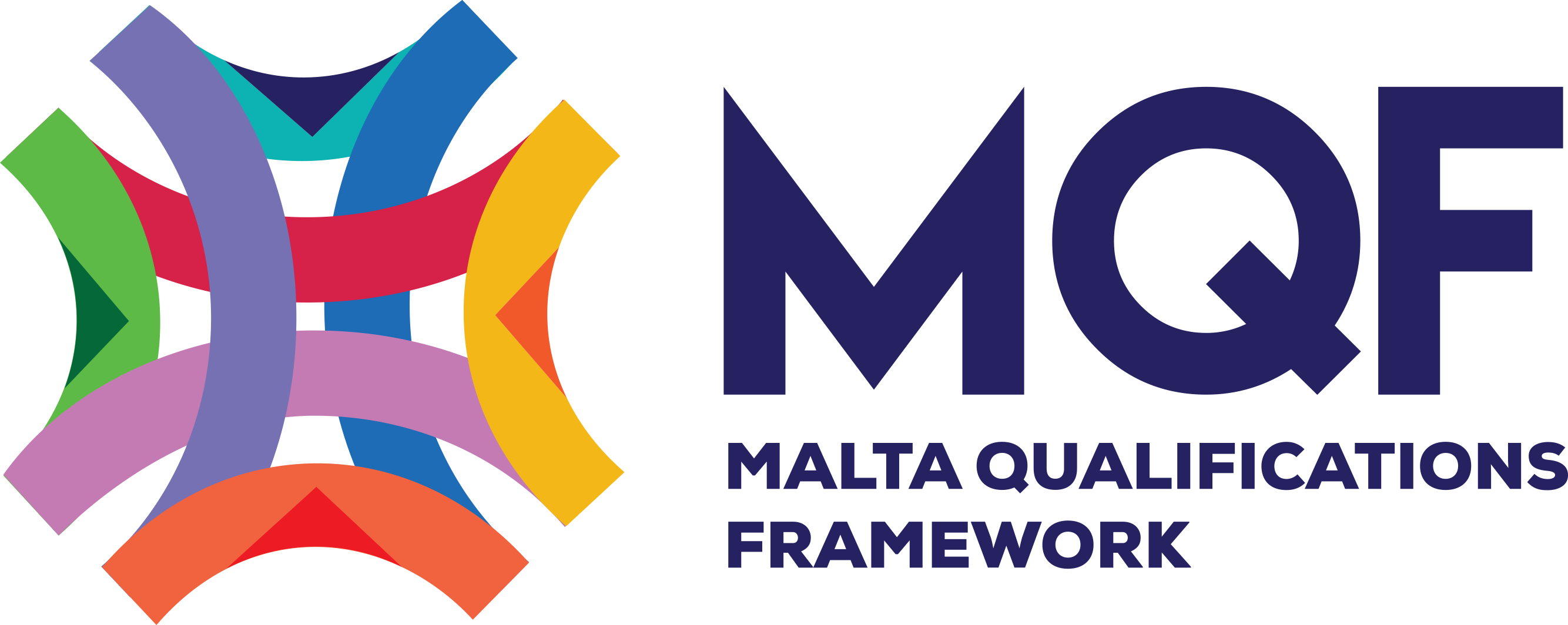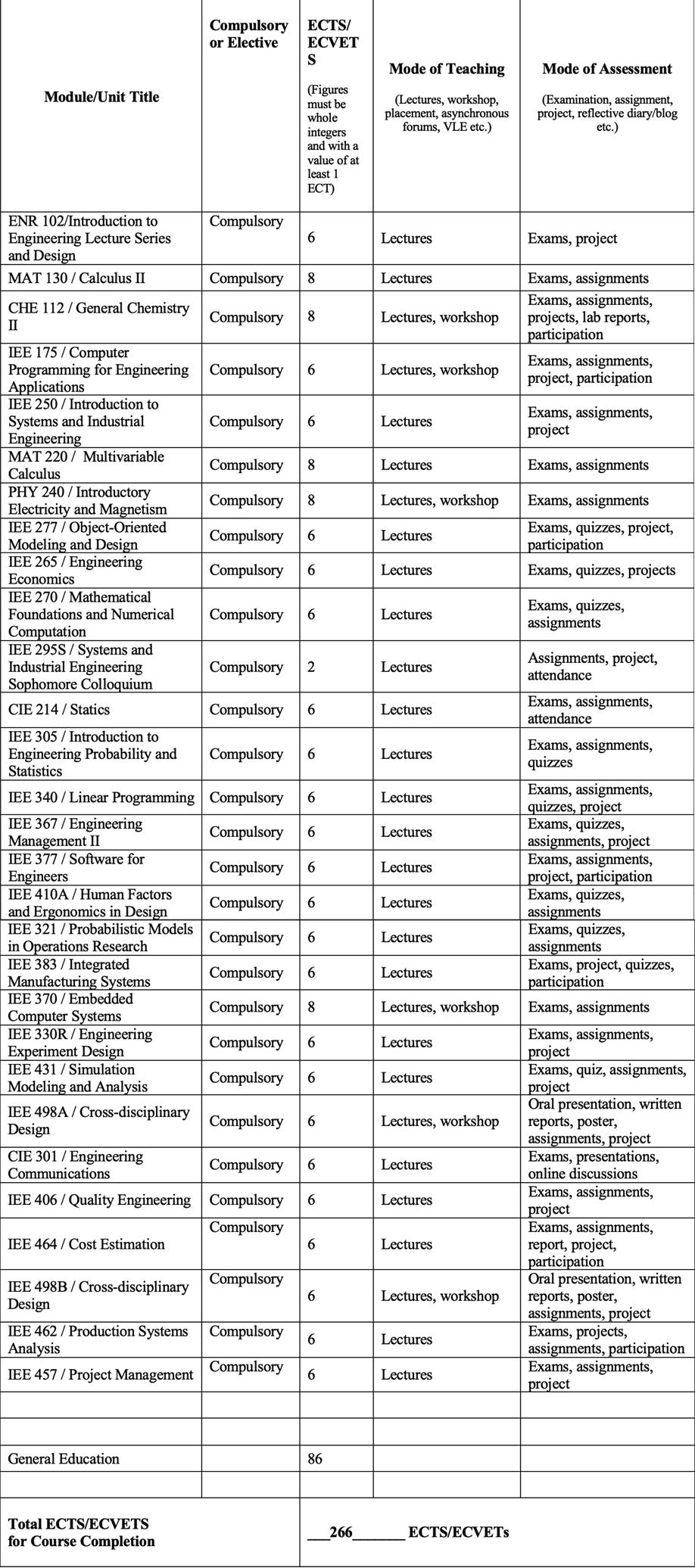BSc in Industrial Engineering

This Program is accredited by the MFHEA
Degree Overview for Industrial Engineering
Engineers make things; industrial engineers make things better. Industrial engineering is essential to ensuring efficiency in any setting. Whether it is manufacturing smart phones or superior automobiles, streamlining an operating room in a hospital, shortening a rollercoaster line at an amusement park, or distributing products worldwide, these challenges share the common goal of saving a company money and increasing efficiency. Our students combine technical knowledge and skills from engineering, business, and social sciences to design, evaluate, monitor and improve system performance. They work to eliminate waste of time, money, materials, energy and other commodities. Industrial engineers take courses in a variety of subjects such as production and process design, production planning, optimization, modeling and simulation, information management, facility layout, job/workplace design, engineering management, material flow, and distribution.
Entry Requirements for this Program
Entry Requirements
Materials required in the undergraduate admissions application: · Official AUM application – Personal statement · Secondary school transcript – Minimum of grades 10 and 11 – Documents should be in English – Official transcript and diploma must be presented before course commences:
- Teacher or counselor recommendation letter · ACT* or SAT* results (for students from the United States of American) · Proof of English Proficiency (for students who did not graduate from a secondary school using English as a medium of instruction). Acceptable proof of English proficiency includes: – IELTS – TOEFL – ACT* or SAT* English/reading score results – Other forms can be decided on a case-by-case situation Undergraduate Admission Requirements · 12 years of schooling expected · Secondary school completion, which can include: – High School Program § 80% or above for grades 10 and 11 in a US system or the equivalent standards in other countries – IB Certificate – GCSE/IGCSE (General Certificate of Secondary Education/International GCSE) § Five subject exams with grades of D or above on each § A/S or A Levels with a minimum of D – For Maltese secondary (sixth form) schooling: § Matriculation certificate · 5 or above in English and Mathematics § A/S or A Levels: three subject exams with a minimum of D – Other school leaving certificate may be considered § Can include IB, AP, or EB.
- Proof of English Proficiency (for students who did not graduate from a secondary school using English as a medium of instruction). Acceptable proof of English proficiency includes: – IELTS minimum of 6.0 – TOEFL § 550 minimums for paper based § 79 minimum iBT § 213 minimum cBT – ACT or SAT English score results § ACT reading 18 or above and 20 or above in English § SAT reading and writing score of 550 or above – IGCSE English as a second language § Grade C or above – Other forms can be decided on a case-by-case situation Admissions decisions are based equally on the above requirements as follows: · 25% on the student high school averages in grades 10 and 11 · 25% on the English proficiency test and/or on the SAT or ACT · 25% A consideration of personal qualities and academic motivation, as determined in the completed application and personal statement · 25% recommendations from teachers and school counselor Work Experience: It is possible that in a particular case a student who does not meet the required minimum grades may be admitted if he or she has significant related experience in a particular field of at least 2 years.
- Additional requirements: Please note that the admissions requirements for specific degree programs may be higher than the general requirements indicated here. For example, degree programs in Engineering require: · IELTS score of 6.5 For Engineering Students from the British System: · A level A2 mathematics · BBB at A Level · GSCE: Science C. · At least one other Science/Technology subject (or equivalent qualification) from the following: Electronics, Materials Science, Physics, Biology, Chemistry, Geology, IT, Further Mathematics, Mechanics, Dynamics or General Engineering. · Minimum grades at GCSE and AS level are set at C · Other suitable skills or experience gained in a relevant industry may be considered.
- *The ACT and SAT can be done several times and the highest scores from each section will be used. Conditional admission is offered for applicants who meet all requirements except English proficiency. Conditional admits must enrol as full-time students in the AUM English for Academic Purposes program. The minimum English Proficiency scores for conditional admits is 4.5 IELTS for undergraduates (or equivalent) or 5.5 IELTS for graduate students (or equivalent).
Program Details
Program length:
48 Months / Full-Time
GPA needed to earn the degree:
2.0 or higher
Credits needed to earn the degree:
133 US credits / 266 ECTS
Degree level:
MQF Level 6
Pass Rate:
73%
Overall Course Learning Objectives
As a result of input from our constituents, the Industrial Engineering Program objectives and indicators are:
- Objective 1: Technical Proficiency. Graduates integrate mathematics, physics, engineering science, operations research, applied probability and statistics, manufacturing technology, production planning, and computer simulation to model and analyze entire systems that are composed of their individual components, subsystems, and processes.
- Objective 2: Professional Growth. Graduates develop and exercise their capabilities for life‐long learning as a means to enhance their technical and social skills.
- Objective 3: Management Skills. Graduates develop and refine their management, communications, and professional skills to increase their effectiveness as team members and team leaders.
The following outcomes support the program educational objectives:
(a) ability to apply knowledge of mathematics, science, and engineering
(b) ability to design and conduct experiments, as well as to analyze and interpret data,
(c) ability to design system, component, or process to meet needs within realistic constraints
(d) ability to function on multidisciplinary teams
(e) ability to identify, formulate, and solve engineering problems (f) understanding of professional and ethical responsibility
(g) ability to communicate effectively
(h) broad education necessary to understand the impact of engineering solutions
(i) recognition of the need for, and an ability to engage in life-long learning
(j) knowledge of contemporary issues
(k) ability to use techniques, skills, and modern engineering tools necessary for engineering practice
(INE-1) The curriculum must prepare graduates to design, develop, implement, and improve integrated systems that include people, materials, information, equipment and energy. The curriculum must include in-depth instruction to accomplish the integration of systems using appropriate analytical, computational, and experimental practices.
Program Learning Outcomes
Outcomes for Communication Skills for the whole course,
The learner will be able to:
a) prepare professional proposals and reports.
b) competently deliver oral presentations to technical and lay audiences.
c) develop and use effective audio/visual aids.
d) write effective professional communications such as email and memorandums.
e) communicate within the engineering disciplines through plans and drawings.
Learning Outcomes for Learning to Learn Skills for the whole course,
The learner will be able to: (a) understand the impact of engineering solutions in a global, economic, environmental, and societal
context (b) recognise the need to engage life-long learning (c) be capable of developing a career plan including options for
advanced education or specialised training to enhance career (d) have the ability to autonomously initiate and engage in life-
long learning.
General Pedagogical Methods used for this Program.
The method of teaching follows the classroom model in which the primary mode of instruction is a flipped classroom model. A set of short lectures prepared by UA lead faculty will be viewed by students and take quizzes on that material prior to attending class. Students will then attend classes that are led by an on-site AUM co-professor. The co-professor will then clarify concerns and lead in-class exercises (problems, design projects, instructing on software, discussions, etc). Often these sessions will be in a collaborative learning environment in which students work in small groups. The UA is successfully employing this approach in several on-campus courses. In special cases, the co-professor will provide supplementary lecture material. Out of class reading and homework assignments will then be assigned, submitted and graded. Students also have the opportunity to engage in one-on-one instruction through office hours given by the co-professors. Laboratory modules involve two to three-hour fully on-site laboratory sessions in which students complete assignments involving hands-on laboratory experiments and supplemental data analysis either individuallyor as part of groups. Laboratories are assessed using written lab reports and/or oral presentations.
GENERAL ASSESSMENT POLICY AND PROCEDURE
Assessments
Engineering disciplines require strong mathematics skills. Assessments (in-class examinations, homework and individual and team projects) will focus on those skills. In addition, some modules have “group presentation” as a mode of assessment, which will focus on communication and team-working skills. Some modules have “team evaluations” as a mode of assessment, which will focus on team-working and management skills. Some modules with labs embedded in the module require additional measurement modes. The range of assessment tools permit students to excel and demonstrate competence in alternative ways. In general, grades will be assigned based on performance on those assessments.
Students with learning disabilities will be addressed by AUM. Additional time or quiet settings will be provided for examinations for those students as determined appropriate.
Cheating and Plagiarism
Exams will be administered in classroom settings by the on-site co-professor. Appropriate identification will be required. Class notes or limited sets of materials may be available to students during exams. Only simple calculators without memory cards will be permitted to avoid students bringing additional materials to assessments. The plagiarism tool, Turn-it-in, will be applied to document reports and papers are not copied from other sources without proper citation.
RELATIONSHIP TO OCCUPATION/S
Industrial engineering graduates go on to a wide variety of careers. Students have taken positions related to manufacturing, entertainment, shipping and logistics, healthcare, project management, transportation, systems modeling, telecommunications, customer service, and government. Many of our industrial engineers use the foundations we provide to pursue management positions in high tech industries. The options for industrial engineers are infinite.
COURSE STRUCTURE SAMPLE
